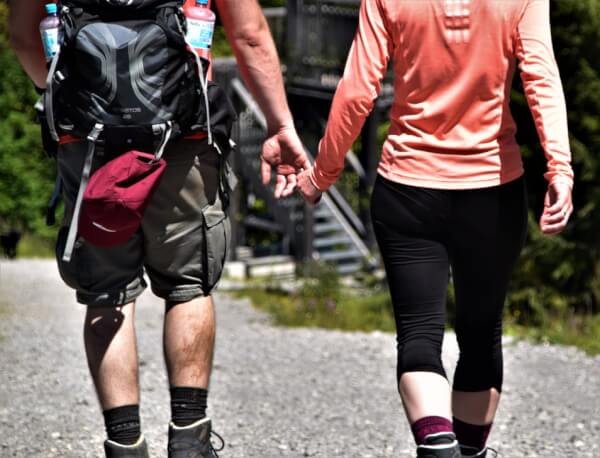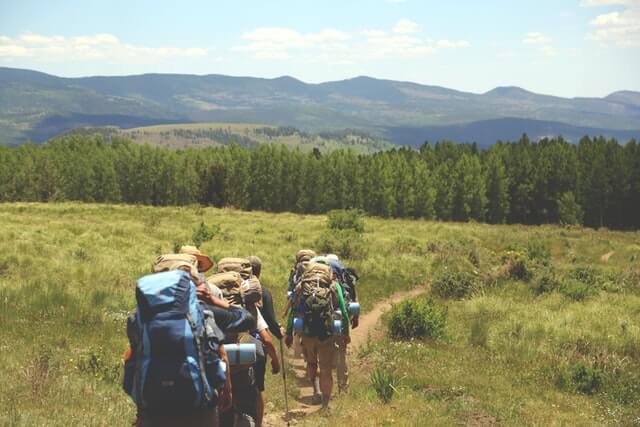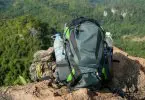If you’re wondering how many calories does hiking burn, the answer is not as simple and as straightforward as you might think. The good news is that hiking does, indeed, burns calories, but exactly how many calories are actually burned depends on a lot of factors.
The degree of difficulty of your hiking trip, your own weight and how much weight you are carrying in your backpack are some of the most important factors that determine how many calories you will burn.
Burning calories while hiking
Hiking can be a pretty intense exercise, an aerobic exercise that increases your heart rate and puts all your muscles to work. You can obviously burn the same amount of calories simply by exercising in a gym – but, while exercising in a gym can be tedious and boring, hiking is the complete opposite of boring.

You are outside, breathing clean, fresh air, enjoying the nature and admiring a new, exciting scenery at every step – so much better than being confined in a gym! Check out our list of the top benefits of hiking that can help you in your fitness goals.
When it comes to the actual calories you are burning while hiking, the answer varies a lot. The average value you should take into account when calculating how many calories you are burning is approximately 430 calories per hour, for a 160-lb person.
See also: Best Hiking Apps: Taking Your Hiking Trips To a New Level
This calculation is based on a medium difficulty hiking trip – one with some level differences in the terrain, where you have to climb and descend hills, generally speaking any type of hike that makes your heart rate double for 20-30% of the time.
However, if we’re talking about very difficult hikes, supposing you are in the mountains and there are very steep slopes, passages that require using climbing wires, areas covered by snow and ice, then you will obviously burn more calories. The more difficult the climb is, the more your metabolism increases during and after the hike.
An intense one-hour hike boosts your metabolism in such a way that you will burn an extra 200 calories later in the day. This metabolism boost can last for many hours – you will be burning extra calories for an average of 14 hours after a long, difficult hike. The longer and more difficult the hike is, the more intense the boost on your metabolism will be.
Your weight also influences how many calories you burn. The average value we stated above is calculated for a 160-lb person. The heavier you are, the more calories you will be burning because your muscles have to work harder to carry that weight.
For example, if you weight 200 lbs, you will burn about 630 calories per hour on moderate terrain, and about 750 per hour during very difficult hikes.
Another important factor you should take into account when calculating the calories burned during a hike is the weight you’re carrying. Obviously, a heavy backpack intensifies your effort, thus leading to more calories burned.
Carrying a light load (a small backpack with water, food, clothes for one day) adds up to 100 calories per hour to the calories you would burn without a load. When carrying a heavy backpack, on the other hand, you will burn an additional 200 calories per hour.
Weather should also be considered when calculating the calories burned during while on a hiking trip. Basically, extreme temperatures (very hot and very cold) make your body burn more calories.
When it’s very hot, your body needs to cool down whether you’re exercising or not. But of course, exercising in hot weather makes cooling down even more necessary. The body’s cooling mechanism relies on the circulatory system: the blood flow on your skin increases, making you sweat. Your body needs a lot of energy in order to be able to do all that extra cooling work which essentially means that you are burning more fat.
However, it’s important not to over do it: after a certain point, your body is no longer capable of cooling efficiently and you might start experiencing heat exhaustion. If you start experiencing nausea or dizziness, it’s imperative to find a cool, shaded spot to rest and to drink plenty of fluids. See our review of the top water bottle to help hydrate yourself while you hike.
Very cold weather also makes a difference when it comes to burning calories. Multiple scientific studies established that your body burns a lot of calories in order to keep warm. Shivering is a sign showing that your metabolism is in overdrive, trying to keep a steady temperature, so you’re actually burning the most calories when you are shivering.
There are even scientific studies that investigate shivering as a weight loss strategy. But, of course, this is not something you should do while hiking. On the contrary, you need to protect from the cold as much as possible. Hypothermia is a huge health risk and occurs when your body starts pumping away blood from the legs and arms in order to keep the core warm.
Cold hands and feet, goosebumps and mild shivering are symptoms of hypothermia. Uncontrollable shivering, difficulty to walk or talk are signs that you are already suffering of severe hypothermia. In case you are experiencing such symptoms, you should try to find a shelter ASAP.
If you are hiking in cold weather, it’s imperative to have a thermal blanket on you. Also, it’s a good idea to pack a small, portable camping stove – hot drinks help a lot with hypothermia.
Other benefits of hiking beside burning calories
As we already stated in our introduction, there are many other benefits of hiking, apart from burning calories. Hiking is a very complete exercise – you are using all your muscles and, more than that, you are also working on other skills: agility, strength, stamina, balancing and coordinating skills, fine and gross motor skills.
When working out in a gym – whether you are on the treadmill, pushing weights, cycling or doing fitness classes – things are pretty predictable. You are doing the same motion or combination of motions over and over again, and there is nothing to surprise you or to break your rhythm. Also, you are generally working one group of muscles at a time (well, maybe two or three different groups of muscles, in case of very complex workouts).
When hiking, you are working your entire body: your legs, obviously, but also all your core muscles, because you are carrying a backpack while climbing hills and trying to keep your balance on seeps slopes, your arm and shoulder muscles.
Because hiking is not predictable nor repetitive, your body needs to adjust rapidly to different rhythms and different types of movements, your heart rate goes up, goes down and up again – all those make hiking more beneficial for your than, let’s say, simply running on your treadmill.
Being outdoors is another benefit. The quality of the air you are breathing while exercising is very important – because your metabolism is accelerated, the rate of oxygen usage is also accelerated. You are inhaling more air and breathing deeper into your lungs, which exposes you to different types of risks if the air is polluted or not exactly fresh.
Let’s break down those risks. First of all, if a lot of people are exercising in the same gym at the same time, the concentration of oxygen in the air drops. Even a small drop in oxygen levels could make you feel sleepy, dizzy, like you lack energy – definitely not the right disposition for a productive training session. Secondly, other people in the gym might be sick with the flu or other viral or bacterial infection, which means you could get sick too.
There is a whole different discussion around exercising outside like in the cities. Air pollutants are higher next to busy roads or industrial areas, and could increase your risks of developing or aggravating asthma which could cause damages to airways of the lungs and could even increase the risks of heart attacks and strokes. All those risks are avoided if you are hiking somewhere away from sources of pollution (highways, factories and so on).
Hiking also has a very positive effect on most people’s mental health. We humans have evolved with having a strong ties with nature, and modern lifestyle almost broke that tie. From time to time, we need time in the with nature to reduce our stress levels and to feel more balanced.
Several scientific studies showed that simply walking through a forest for a while can have a huge impact on our physical and mental health, from lowering blood pressure to reducing stress levels.
Natural daylight is another benefit of hiking. Sunlight makes you feel more energetic, more optimistic. It is well known that artificial lighting can negatively impact your health and your mood (it makes you agitated, increases blood pressure, messes with your sleep patterns and increases the risk of cardiovascular diseases).
You might think you are spending enough time outside to avoid such risks, but, if you think about, a lot of people are spending most of their time exposed to artificial lighting. Many offices don’t have windows or the windows are not large enough which means that people are working in artificial light.
Most malls and supermarkets rely on artificial light and, even at home, we are spending more time in face of different screens than outside. This is why it’s very important to schedule time away from all that, and a hike is the perfect way to work out in order to improve your physical and mental health.
Keeping safe while hiking
While hiking does, indeed, burns a lot of calories, it’s not a method for weigh loss. Or, at least, this shouldn’t be your main motivation. You might end up losing weight on the long term, as you become more and more active and spend more time outdoors. And, beside losing weight, you’ll be experiencing all of the other perks of hiking we detailed above.
But it’s definitely not a way of losing weight fast and, if you are a beginner when it comes to hiking, it’s more important to find your rhythm and enjoy yourself instead of focusing on calories and weight loss. Being safe should be your main concern, because hiking sometimes implies being on your own, exposed to the elements, without phone coverage.
So, let’s see what you should consider before you start hiking.
Difficulty of the hike and experience level
The difficulty of the hike should be correlated with your level of experience. If you’re only now starting to hike, pick short, easy tracks and gradually increase the difficulty level.
You’re not doing yourself any favors if you put yourself in a potentially dangerous situation for the sake of losing weight of burning calories. A mountain track you’re not ready for will literally put your life in danger, so always make sure you’re up to the challenge.
Pack enough food
Hiking is pretty intense and you need energy to reach the end of the trail. Energy means food and you must pack enough while also taking into account the fact that a hike can sometimes take more time than you initially estimate. Maybe the weather is bad and you must stop and find shelter for a while, maybe the terrain is harder for you than for other people.
Anyway, you must be prepared for all situations. Make sure that beside the food you will need for the hike, you should also bring some extra supplies: energy bars, nuts, dried fruits, jerky and other food items that are easy to carry but pack plenty of calories.
Water
Water is even more important than food. Most beginner hikers underestimate the quantity of water they need. Considering the fact that you are making an intense effort, you need a gallon of water for a long summer hike.
Find a hiking partner
It makes the whole thing a lot more pleasant. If you are planning to go on a day hike or a backpacking trip by yourself, it’s essential to let someone know where you will be and when you are supposed to be back, especially if you don’t know if you’re gonna have phone coverage or not.
Proper clothing
Get proper clothes, footwear and protective equipment, especially if you will be spending the night outside.
Check out: Best Hiking Kilt: Find the Perfect Fit for Your Outdoor Treks
Exposure to extreme temperatures like rain, wind, snow and so on can exhaust you pretty fast, so it’s important to have the right clothing and protection for the season and the region where you will be hiking.
It doesn’t take long for insulation or hypothermia to occur – if you’re not protected properly, even a short hike puts you at risk.
Final thoughts
To conclude, hiking doesn’t simply burn calories – it’s a very complex type of training that benefits both your body and your mind. Hiking is for everyone, young or old, in shape or sedentary.
You simply have to follow some basic safety rules, to take things slowly and increase the difficulty of the hikes only when you are sure you’re up to the challenge. The benefits you’ll reap from hiking are long-term and will have a positive impact on many aspects of your life. For our top list of the best hiking spots in the world, see our earlier article on this topic.
Featured Image Source: https://unsplash.com/photos/juHayWuaaoQ








